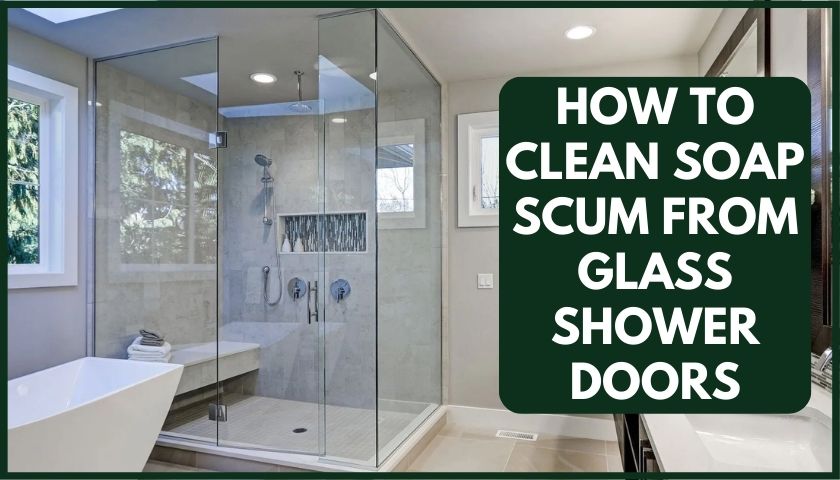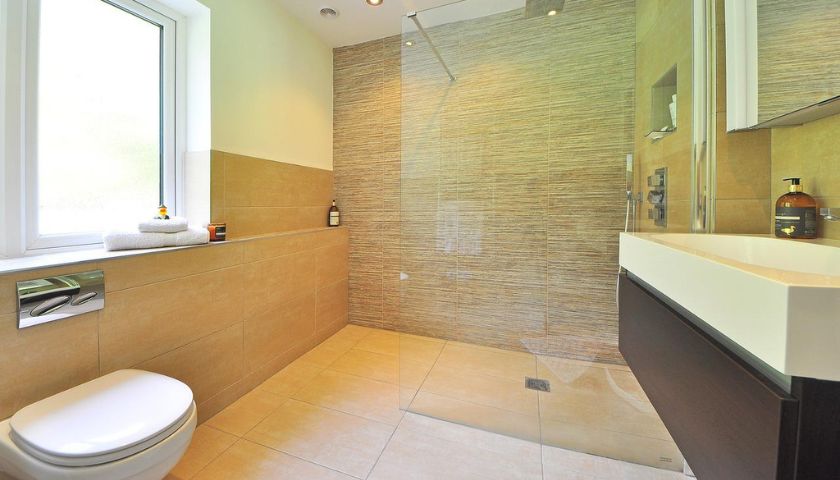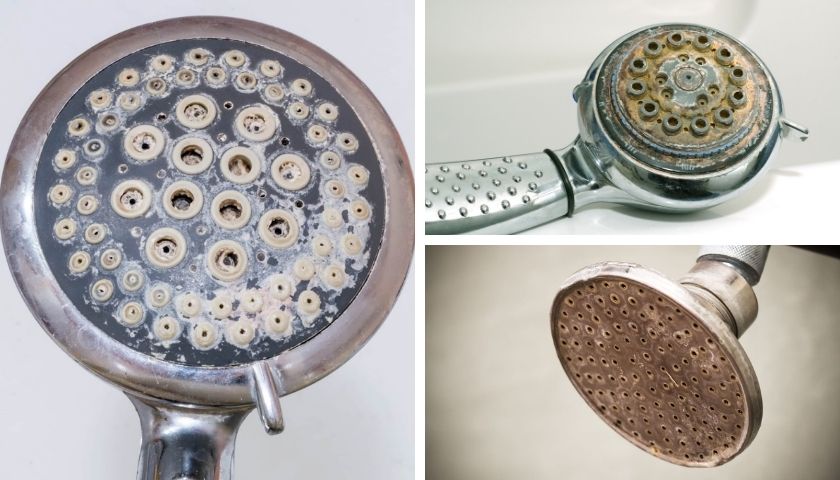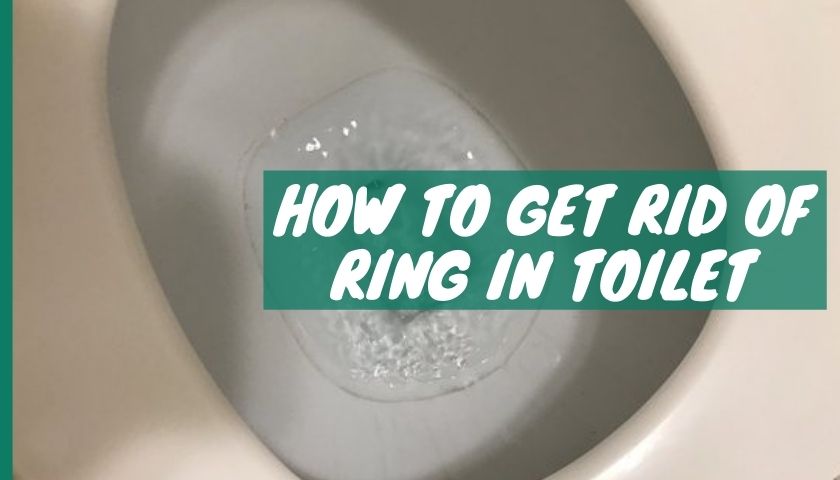How to Remove Hard Water Stains from Bathroom Floor Tiles
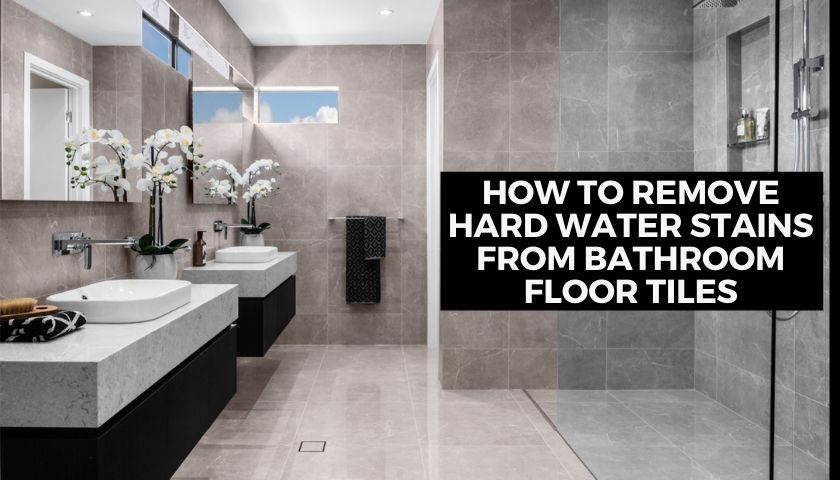
As an Amazon Associate I earn from qualifying purchases.
Almost all of us have witnessed and suffered from brown stains forming on our bathroom walls.
Continuous use of hard water causes stains on your bathroom walls, sinks, showers, and everything in there. These hard water stains are really non-appealing and very hard to remove.
In order to prevent these once and for all, it is essential to know how to remove hard water stains from bathroom floor tiles. So, let’s look at the methods to get rid of this problem.
Contents [hide]
Why Does Hard Water Stain?
Hard water is just regular water, but sometimes it can have a higher amount of calcium and magnesium in it. When you continuously use this hard water, these two elements create an invisible layer on the tiles, the sink, the shower, and everything in the bathroom.
When you shower or use more water, this invisible layer gets mixed with minerals from the water and forms crystals and dirt particles. These look like brown stains on the bathroom floor tiles and walls.
3 Effective methods to remove hard water stains from bathroom floor tiles
While the problem is massive, you can use some tricks and methods to get rid of these hard water stains from the bathroom floor tile. There are 3 methods that are most effective against this.
Method 01: Vinegar and Baking Soda
For this method, you are going to need the following materials:
- Vinegar
- Baking Soda
- Sponge or Brush
- Clean Towel
Step 1: Make The Paste
Mix equal parts of vinegar and baking soda on a bowl. This will be a slightly abrasive mixture. This abrasiveness will loosen up any mineral crystals or dirt caused by hard water.
Step 2: Apply The Paste
Take the paste and apply it to the areas of the stain. Make sure you are spreading all over the places where brown stains are. If you don’t have enough paste to spread all over the stained tiles, make some more paste.
Step 3: Let It Sit
After spreading completely, let it sit for around 10 to 15 minutes. The paste will break up the molecules of the brown stains and loosen them up for easy cleaning.
Step 4: Scrub the Tiles
Scrub the tiles with a sponge. Do a circular motion while scrubbing to take out the dirt easily.
Step 5: Rinse
After scrubbing, rinse the tiles with fresh, clean water. Make sure you wash all the scrubbed tiles.
Step 6: Let Dry
After rinsing with water, take a clean towel, and wipe. Make sure you dry the tiles completely.
Method 02: Soaking with Vinegar
You will need the following materials:
- Vinegar
- Brush
- Clean Water
- Clean Towel
Step 1: Soak with Vinegar
Pour vinegar into the affected area. Make sure all the stained area is covered with vinegar.
Also, soak a cloth in vinegar. Then, put it covering over the stained area. This is more useful when you are only cleaning the floor tiles, not the wall tiles of the bathroom.
Another method is using a spray bottle. With that, you can spray the vinegar on the tiles.
Step 2: Give it Time to Sit
If you have poured or sprayed the vinegar on the tiles, let it sit for 5 minutes to loosen up the stains. If you have placed a vinegar-soaked cloth on the bathroom floor tile, let it sit there for 10 minutes.
Step 3: Scrub
Remove the cloth, and scrub the tiles or affected area with a brush. Stop when all the stain marks are scrubbed.
Step 4: Rinse & Dry
Rinse the tiles with clean water. After rinsing, take a clean towel, and wipe the bathroom floor or wall tiles to remove excess water.
Method 03: Using Micro-Abrasive Cleaner
While there are natural materials like vinegar and baking soda, you can also use micro-abrasive cleaner to clear away the hard water stains. For this method, you will need the following materials:
- Micro-abrasive cleaner powder
- Water
- Sponge
- Clean Water
- Clean Towel
Step 1: Paste Making
Mix the micro-abrasive powder and water together to create a paste. Use equal parts of both, so the paste does not become too runny or too hard.
Step 2: Paste Applying
Take the paste, and apply it directly over the stained tiles. Make sure you spread and cover all the stained areas. Let this sit on the tiles for around 15 minutes.
If the hard water stains are mild, skip step 1 and put some powder directly over the stains.
Step 3: Scrubbing
Take a sponge, and scrub the tiles. Use a circular motion for better scrubbing. Continue scrubbing till you can see the stains coming off from the tiles.
Step 4: Rinse and Dry
Rinse the scrubbed tiles with clean water. After rinsing, wipe with a clean towel to remove any excess water. If you don’t remove the excess water, they will start to put stains again.
Read next: How to prevent hard water stains in the toilet
What are the Harmful Effects of Hard Water?
If the water supply in your area carries hard water, sooner or later you will face multiple problems caused by hard water.
Scale Buildup on Showers and Appliances
Hard water causes mineral crystals to build up and form brown stains on the tile. While you can clean them, the same thing is happening inside appliances like faucets, showerheads, dishwashers, coffee pots, etc. These can lead to damage to these appliances and also become obstacles in the water flow.
Stains on Sinks and Toilets
Hard water causes similar brown stains on the sink, the inside and outside of a toilet, bathtub, etc. While regular cleaning will make these clean and shiny, regular cleaning is a hassle and also costly.
Costly Plumbing Repairs
As scales build up in the faucets, showers, and taps, it also forms inside the water pipes and connections. Sometimes these break up due to this buildup and blockage, and you will need to repair these more than normal.
High Water Bills
The scale buildup inside the water pipes can cause leaks and even breaks. Even from a slight leak, a lot of water will be wasted in the process, and you will need to pay higher water bills.
Dry Hair and Skin
The excess magnesium and calcium in the hard water can cause your hair and skin to feel dry. The water is not nourishing the hair and skin, but rather damaging and making you feel dry and faded.
Stained Dishes
Even after cleaning your dish regularly with soap and water, over time, you will see stains on the dishes and glassware. This will lead to less appealing looks, and result in you losing appetite.
Frequently Asked Questions (FAQ)
How long does vinegar take to remove limescale?
It takes at least 30 minutes for the vinegar to remove limescale. For a really bad limescale, soak the toilet overnight.
Can hard water stains be permanent?
Yes, hard water stains can lead to becoming permanent. you need to clean the stains regularly to prevent this. The more time it sits on the bathroom tile; the more effort it will take to get removed.
Wrapping Up
If we do not take care of the problems caused by hard water, it will lead to things like permanent stains, damage to our plumbing pipes and toilet appliances, harm us physically, and also affect us financially.
Now you know how to remove hard water stains from bathroom floor tiles taking care of bathroom tiles will be much easier.
Hopefully, the information and tips in this article will be helpful to you, and always call professional help when things get too much confused and damaged.
As an Amazon Associate I earn from qualifying purchases.



